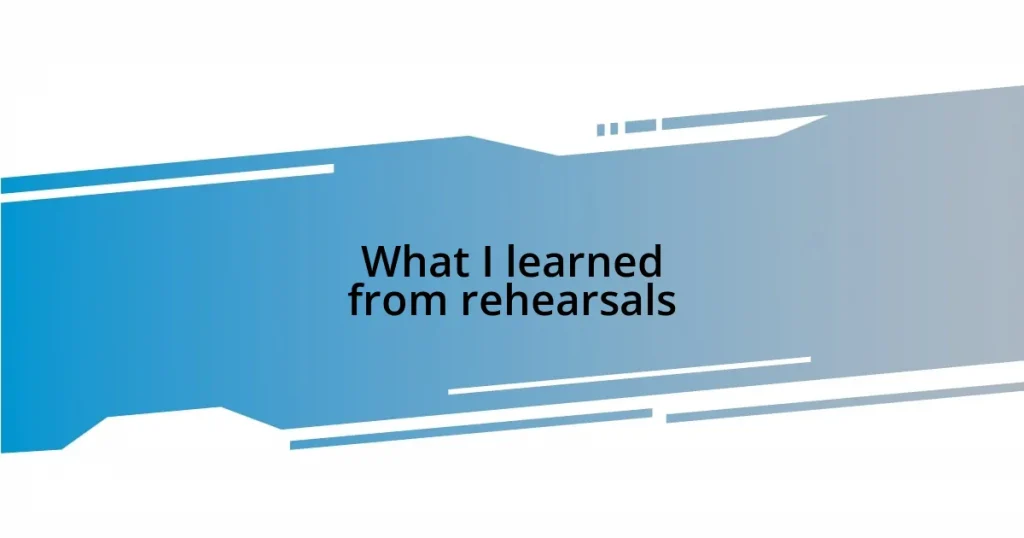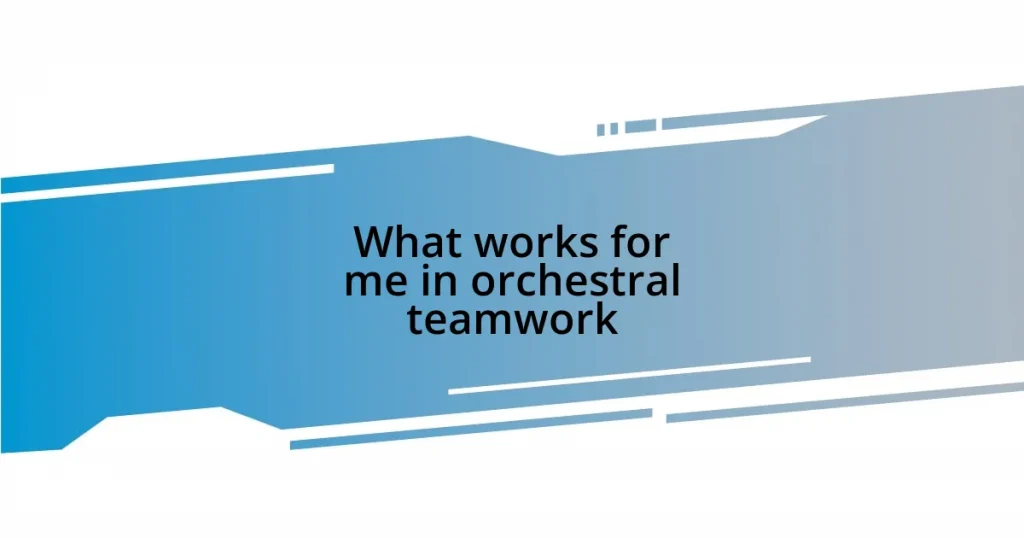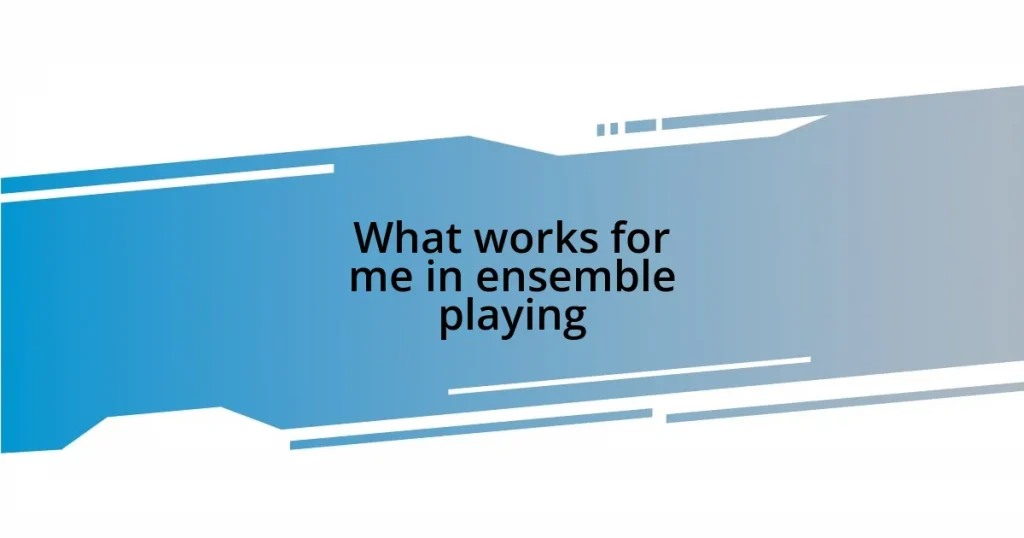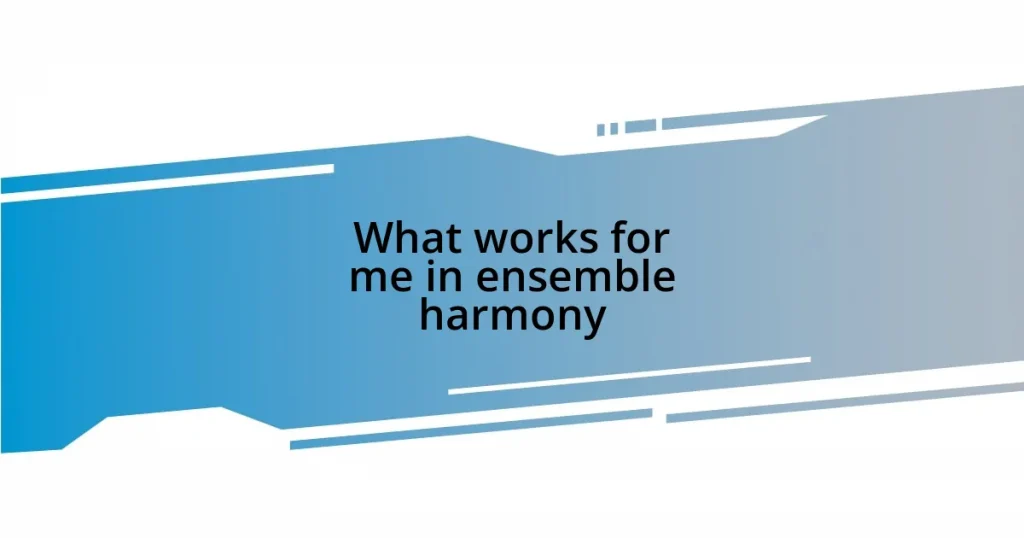Key takeaways:
- Trust and open communication in rehearsals foster a collaborative and creative environment.
- Embracing conflict can lead to innovative solutions and artistic breakthroughs.
- Setting clear objectives and incorporating feedback enhances rehearsal effectiveness and focus.
- Sharing personal stories and celebrating small victories strengthen group cohesion and morale.
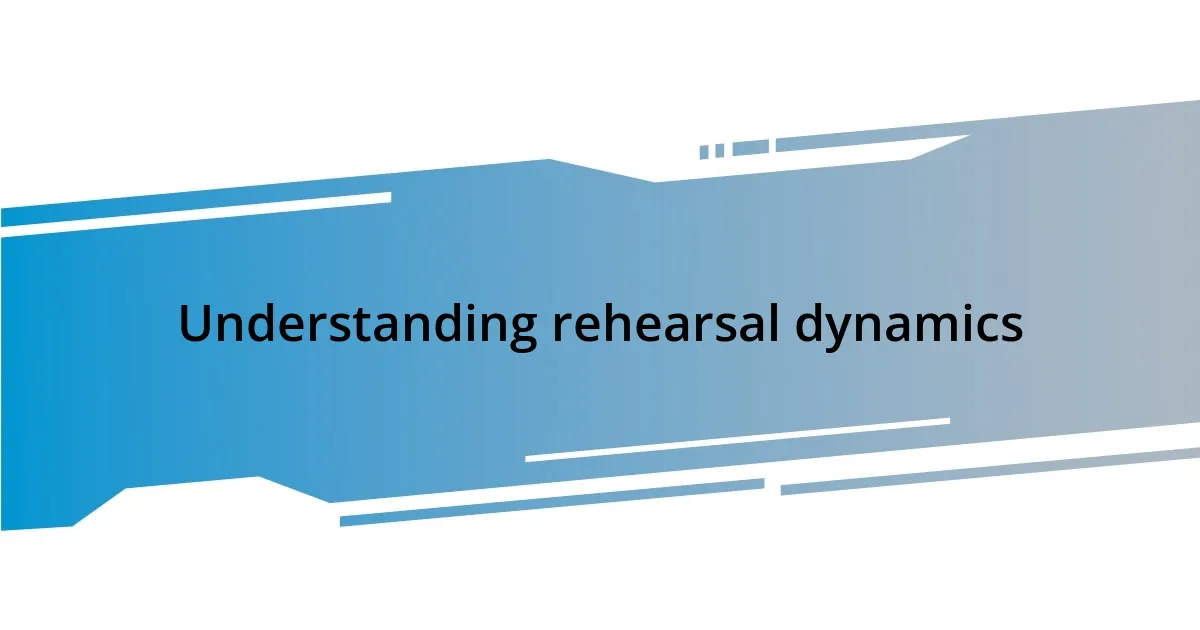
Understanding rehearsal dynamics
Understanding the dynamics of rehearsal is fascinating. I remember my first rehearsal; the energy in the room was palpable. Each member brought their unique interpretations, creating a beautiful tapestry of ideas, which made me question: how do different personalities influence the overall outcome?
One key aspect I’ve noticed is the importance of establishing trust within the group. When I felt comfortable sharing my thoughts, I noticed others opened up too. It’s amazing how a supportive atmosphere can transform a rehearsal into a collaborative workshop, where everyone feels valued and creativity flourishes.
In rehearsals, conflict isn’t necessarily negative. I learned that disagreements can spark innovative solutions. For instance, a debate over a scene’s interpretation led us to discover a depth we hadn’t initially considered. Have you ever experienced a similar breakthrough? Those moments remind us of the beauty in differing perspectives; they push us to think beyond our initial ideas and grow as artists.
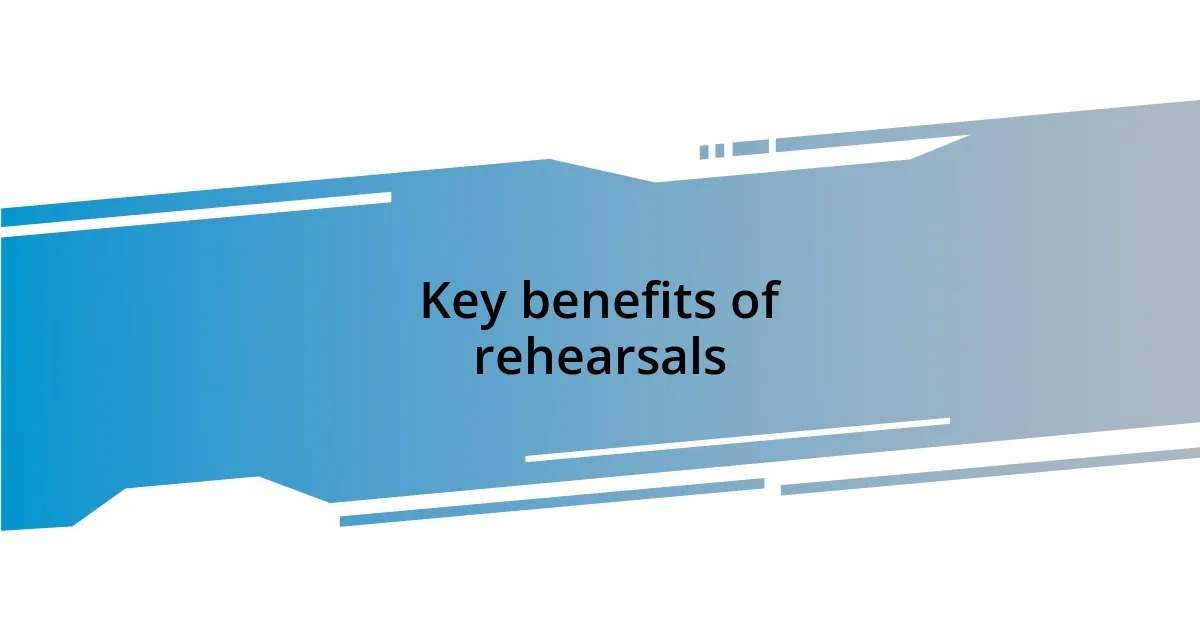
Key benefits of rehearsals
One of the key benefits of rehearsals is the development of a collective synergy among team members. I still recall a time when I thought a scene was flawless, only to realize during a rehearsal that my fellow actors had different perceptions that enhanced the performance. It was eye-opening to see how collaboration can elevate the piece from good to extraordinary, making it a shared vision rather than just my own.
Another significant advantage is the opportunity for personal growth. I remember struggling with my lines in one rehearsal, and instead of feeling embarrassed, my peers rallied around me. Their support transformed a moment of insecurity into one of empowerment, teaching me that rehearsals not only refine our craft but also build our confidence as performers.
Lastly, rehearsals provide the perfect environment for experimentation. In one instance, I decided to try an unexpected physicality for my character. The result was a surprising and delightful shift that added depth to my portrayal, proving that rehearsals are a safe space to take risks and explore creative boundaries. Isn’t it liberating to know that it’s all part of the process?
| Benefit | Description |
|---|---|
| Collaboration | Rehearsals enhance creativity through the synergy of diverse perspectives. |
| Personal Growth | They foster confidence and individual development within the group. |
| Experimentation | Rehearsals invite risk-taking in a safe environment, encouraging exploration. |
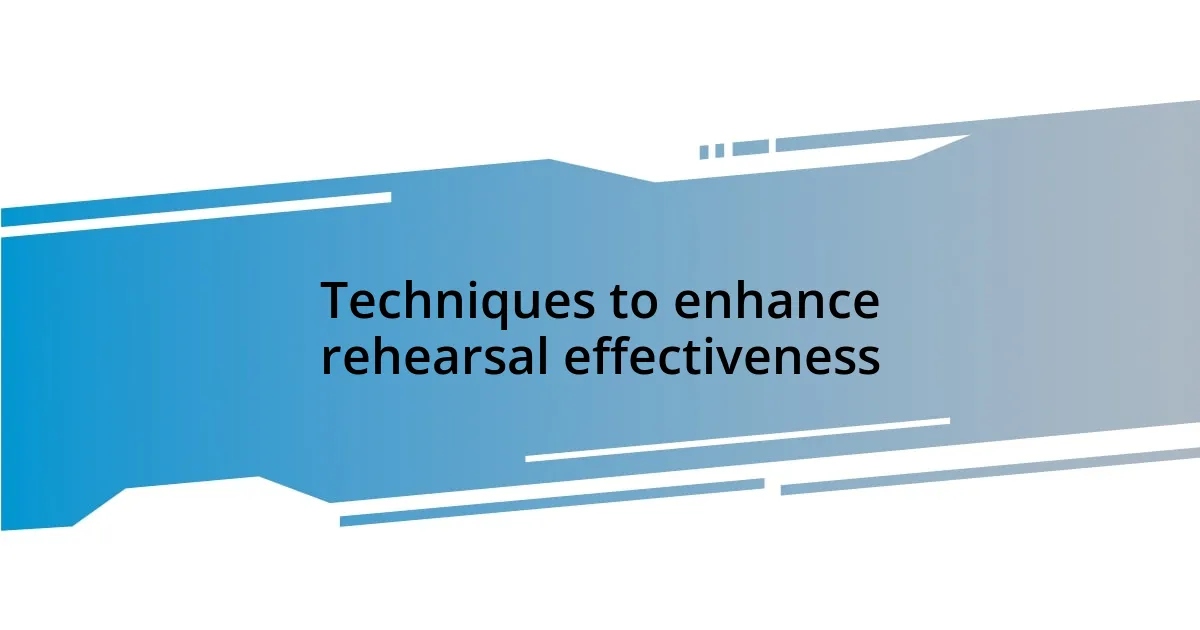
Techniques to enhance rehearsal effectiveness
One technique I’ve found incredibly effective is setting clear objectives for each rehearsal. When I first adopted this practice, it felt a bit rigid, but I quickly learned that having a focused goal transformed our sessions. For example, during one rehearsal, we decided to concentrate exclusively on character development. This clarity allowed us to dive deeper, revealing layers and motivations that previously lay hidden. Trust me; the energy shifted when everyone showed up with a purpose.
To further enhance rehearsal effectiveness, I recommend incorporating the following techniques:
- Warm-up exercises: Engaging in physical and vocal warm-ups helps to get everyone in the right state of mind and body.
- Feedback loops: Establish a practice where everyone shares constructive feedback. It creates an open atmosphere for growth.
- Role-switching: Occasionally switching roles can provide new perspectives on characters and scenes, fostering empathy and understanding.
- Time limits on scenes: Restricting how long you spend on specific moments can encourage spontaneity and creativity.
- Recording sessions: Watching rehearsals can be enlightening. It allows performers to see themselves from the audience’s perspective, highlighting areas for improvement.
I vividly remember an instance when we decided to record a rehearsal. Watching it afterward revealed nuances in my performance that I hadn’t even noticed. It’s those little discoveries that shape us as artists and elevate the entire production. The joy of learning from each session deepens our connections and fortifies our collective artistry.
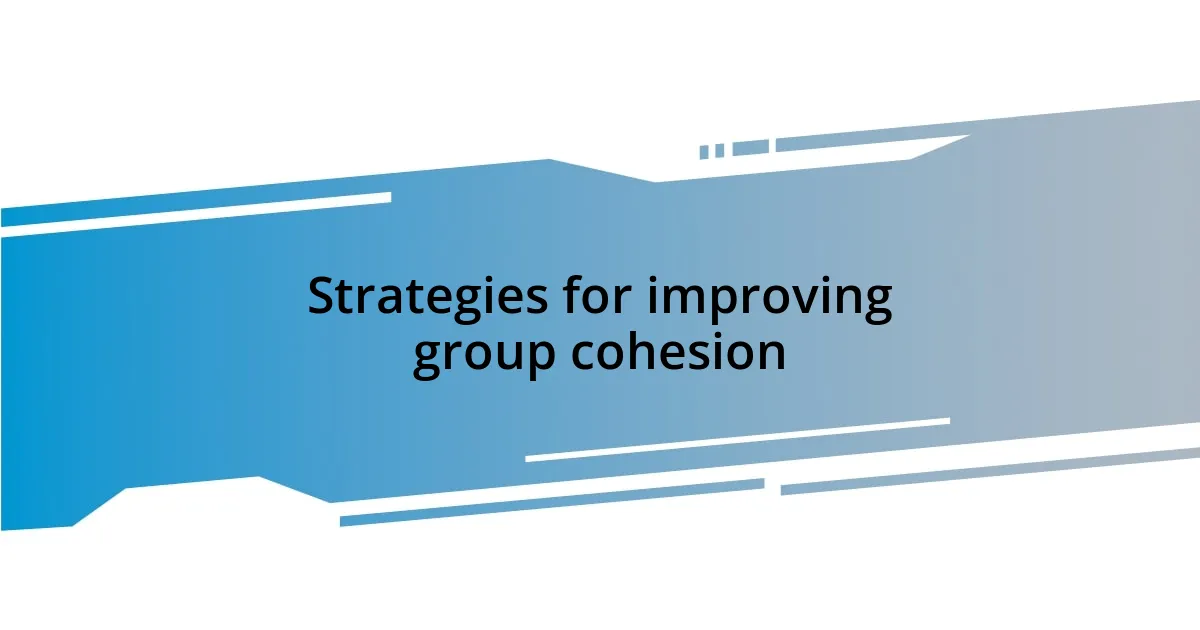
Strategies for improving group cohesion
One of the most effective strategies I’ve found for improving group cohesion is simply sharing our individual stories. During one rehearsal, we took a break and shared personal experiences related to our characters. It was a powerful moment that opened up channels of empathy. Suddenly, we weren’t just actors; we became a team, connected by our shared vulnerabilities. Have you ever noticed how stories can unite people in unexpected ways?
Another strategy that truly works is celebrating small victories together. I recall a particularly intense rehearsal where we finally nailed a challenging scene after weeks of struggle. Instead of moving on right away, we paused to genuinely acknowledge our hard work. That moment of celebration not only boosted our morale but reinforced our commitment to one another. Isn’t it amazing how recognizing achievements, no matter how minor, can strengthen bonds?
Lastly, actively engaging in team-building activities outside of rehearsals can create a deeper connection. On one occasion, we organized a fun outing that had nothing to do with our production. The shared laughs and relaxed interactions allowed us to see each other beyond our roles. I realized that when we trust each other as individuals, we collaborate better as a cohesive unit when the rehearsal starts again. How do you think such moments impact the performance atmosphere?
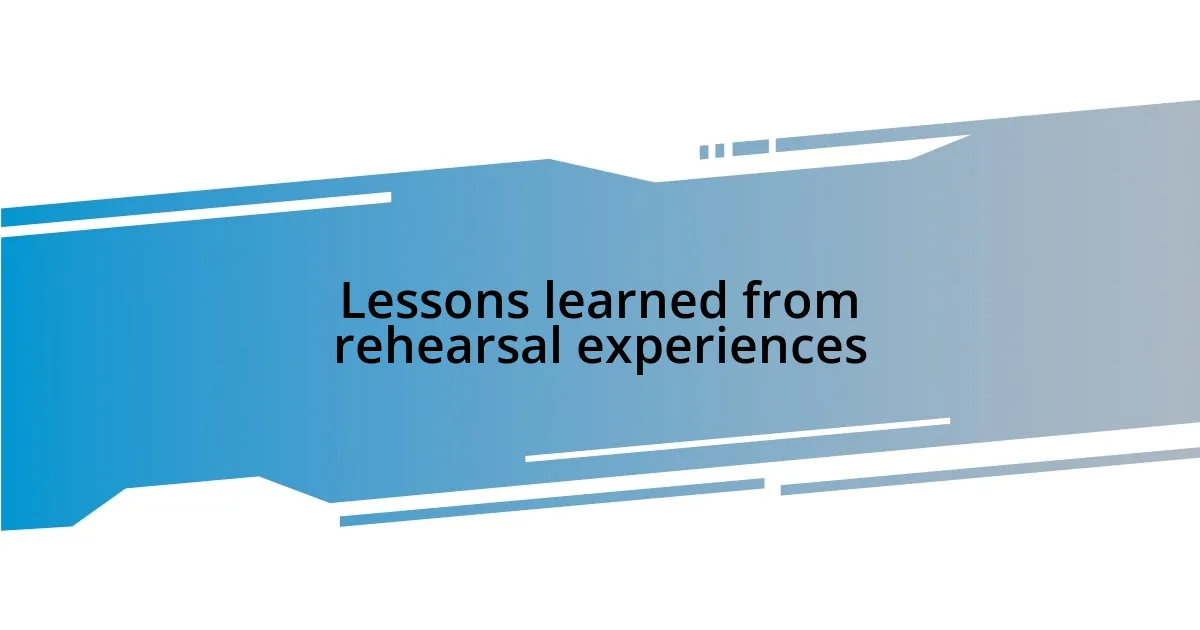
Lessons learned from rehearsal experiences
Rehearsals always come with a treasure trove of lessons. One significant takeaway for me was the importance of adaptability. I recall a rehearsal where our director decided to switch the order of scenes on a whim. At first, I felt thrown off—my mind was rigidly set on the flow we’d practiced. However, that experience pushed me to be more flexible, teaching me that sometimes, the unexpected can lead to groundbreaking interpretations or new emotional beats. Have you ever had a moment where adapting your approach led to a surprising breakthrough?
Another lesson I’ve absorbed from rehearsals is the power of vulnerability. There was a rehearsal when I shared a personal fear that related to my character’s journey. The reaction from my castmates was overwhelming; not only did we bond over that shared experience, but it also sparked a deeper level of authenticity in our performances. It made me realize that allowing ourselves to be open can enrich the entire creative process. Have you found that bearing your soul can transform not just your performance, but the group dynamic as well?
Finally, I’ve learned that patience is vital in the rehearsal process. I still remember countless times when a scene just wouldn’t come together, and frustration would creep in. Yet, in those moments of pause and reflection, stunning breakthroughs often emerged. Instead of rushing through, taking a breath allowed us to rediscover the essence of our characters. It’s a bit like tending to a garden—sometimes, the best blooms appear when you give them the time and space they need. How do you cultivate patience in your rehearsal routine?
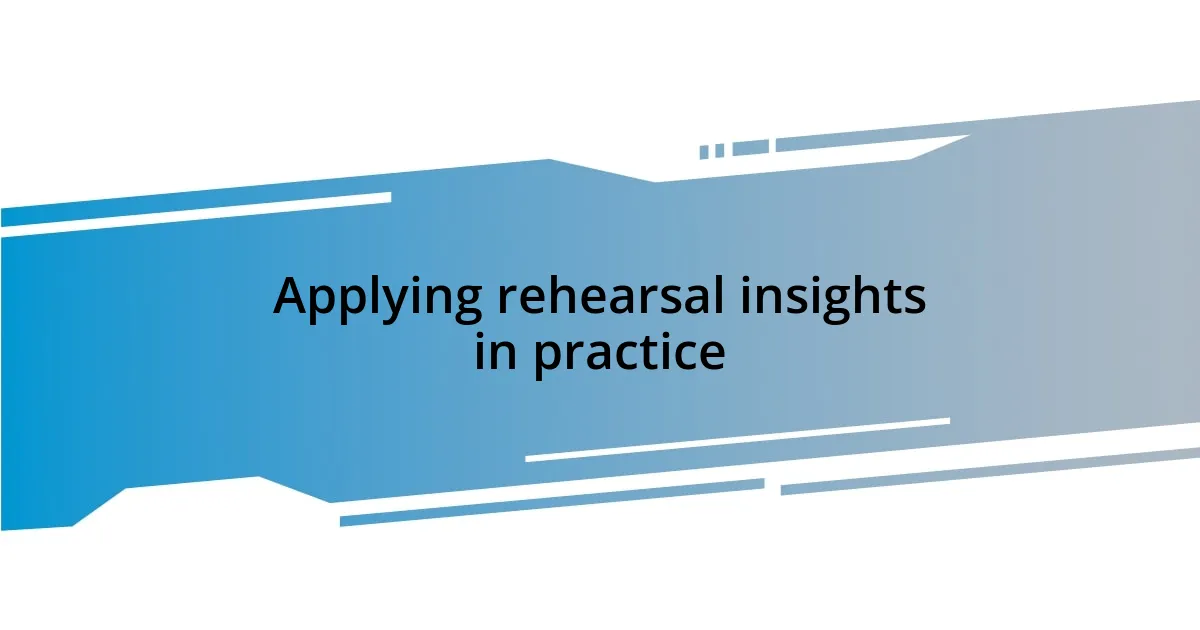
Applying rehearsal insights in practice
Applying rehearsal insights in practice can open up new dimensions in our performances. I often found myself reflecting on the adaptability I gained during rehearsals. For instance, there was a time when an unexpected change in my character’s backstory dramatically shifted my perspective. I had to step outside my comfort zone and embrace this new layer, which ultimately added depth to my portrayal. Have you ever experienced a moment where a change turned your performance into something extraordinary?
Embracing vulnerability is another powerful insight that has made a lasting impact. I remember a rehearsal where we were asked to have an honest discussion about our fears surrounding the characters. As I shared a deeply personal fear, there was an authentic silence in the room; it felt like we were all stripped down to our core. This openness not only strengthened our bond but also infused our subsequent scenes with a raw energy that was palpable. How does being vulnerable in your creative space shape the work you produce together?
Lastly, I’ve learned that reflection post-rehearsal is invaluable. After a challenging session, my team and I would often gather for a debrief, discussing what worked and what didn’t. This practice became a mirror for us, illuminating the strengths and weaknesses in our performances. I’ve come to realize that these moments of reflection allow us to calibrate our approach and elevate the overall quality. Have you found value in taking time to reflect as a group after a rehearsal?











